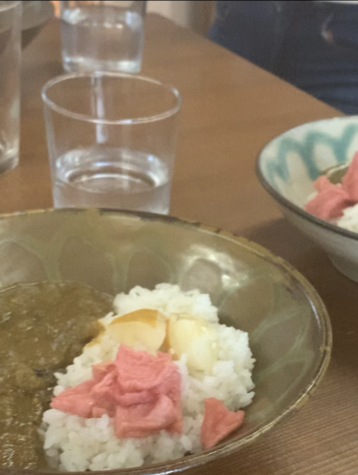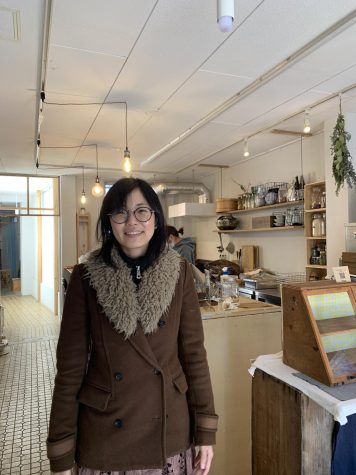elab promotes sustainability through “the power of food”
“I believe in the power of food,” Takako Ohyama, the CEO of elab inc.
annca from Pixabay
Circular economy is a way to recreate the supply chain and create a sustainable economy.
March 8, 2023
“I believe in the power of food,” Takako Ohyama, the CEO of elab fig,inc..
In Japan, the issue of waste management is enormous. The 23 wards of Tokyo create 16 million tonnes of waste annually, with more than 30% of that value being generated from business and household waste, according to an article in the Journal of Economic Structures. This waste has been put into landfills as well as sold overseas; however, Japan still struggles to dispose of this extensive quantity of waste as well as decreasing the substantial amount of waste in landfills.
In our daily lives, we use raw materials out of the earth and create products. These products are sold to the consumers. Once these products are used, they are thrown away and disposed of. This system of economy is called a linear economy, according to the Australian circular economy hub.
However, recently a new model of economy has started to gain popularity. A circular economy is a model of economy that focuses towards extending and sustaining the life cycle of products. As Ohyama explained in an interview, a circular economy is “how we recreate the supply chain management… In circular economy, we think how we can reduce waste in each process.” This concept is gaining more attention around the world due to the urgency to sustain our earth and its environment. One participant of this model of economy are small businesses.
Small businesses have always been an integral part of society. In Japan, the term SME (Small and Middle Enterprises) in retail is described as enterprises with 49 or fewer employees and paid-in capital less than 10 million yen, according to the World Bank Institute.
The SME agency in Japan states that 99.8% of retail businesses in Japan are part of SMEs, leading them to be a big part of the Japanese economy. This means that the SMEs you support can help create a huge impact economically and socially within a society.
With the linear economy becoming a significant issue in our world, supporting SMEs with a circular economy over larger enterprises can create an economic impact towards sustainable development.
However, one question remains unanswered: What do SMEs offer that big corporations cannot?
The story of elab helps answer this question.

Elab is a small sustainable business which aims to utilise and promote a circular economy in Kuramae, Tokyo. They sell baked plant based products as well as other plant based snacks. They also offer a plant-based lunch including rice and green curry with many types of tsukemono during the afternoons. This follows the model of a circular economy as the food you consume in a plant-based diet, goes back to the soil, reusing this material, contributing to a more sustainable society.
Ohyama used to live in Brooklyn, when she noticed how important it was for people living there to connect with “each other inside of the community.” She also noticed that the small businesses that existed in the area were quite popular.
For instance, she mentioned “when gentrification is going to happen… bigger businesses came into the area and people didn’t like it. People wanted to keep the small business for locals to enjoy and see each other.”
She observed that in these small businesses, many times the consumers knew the owners of these small businesses and therefore knew where they were getting their ingredients from. This made many consumers conscious about what kind of food they are actually eating.

This made her realise, “how daily life is related to sustainability.” Later, she returned to Tokyo and observed that in Tokyo, “we are seeking for someone to talk with or relate as a communityship, but we don’t have it.” She found that most people tend to go to supermarkets rather than small community shops in Tokyo, and the connection to community in Japan is lacking. She considers food to be a way to bring communities together, and is why she started elab. She said, “I believe in the power of food.”
With small businesses being able to have such conversations, they provide a way for sustainability to spread throughout society. When you enter elab, you are greeted by the employees who engage in conversation with you. They explain the ingredients and flavour of seasonal baked goods, during autumn, they offered plant-based pumpkin pies while during the winters they offered plant-based ginger cookies. These conversations help invite more customers to talk about circular economy.
Small businesses can also help support other small businesses through locally sourcing products. Elab sources its products from local farms and stores. One example of this is the carrot cake that is the seasonal cake for the month of February. The carrots were sourced from Kaze no Kaze farm. The Dandelion chocolate cocoa husk muffins are made from oranges sourced from a small restaurant called kijiya san.
To promote sustainability, elab also has a display and box of exchangeable kids clothes, which engages people walking by. This allows the further start of a conversation and an exchange of sustainable ideas. Ohyama stated that, “You don’t have to eat in here, there is [other] ways to interact with us by exchange [of] kids clothes.”
As Ohyama said,“If we can change the people’s mind in a sustainable way, people can naturally think of a circular economy style life.”
However, there are a few issues with this goal of spreading sustainability through small businesses.
One of these issues, Ohyama mentions, the financial toll of starting small businesses in Tokyo. “It’s hard to find financial resources,” she said, “There are subsidies from the government, but you have to start from that.” The time it takes for sustainable small businesses to set up can take as long as a year. Building a customer base takes up even more time.
Another issue with spreading sustainability through small businesses is the reach being relatively small. One shop alone cannot do anything. As Ohyama said, “You want more people to get involved.” However, keeping in mind the many sustainable small businesses across Tokyo, she also mentioned, “If we unite together, it gets bigger and we can make this community better. I guess that’s the power of small businesses.”
An individual small business may not be able to achieve sustainability, but elab shows the connections a small business can make and help other small businesses spread sustainable initiatives in Tokyo. One example of this is the karaage shop nearby elab. The owner of this shop met up and became friends with elab. Elab’s sustainable way inspired him to, said Ohyama, “do business in a sustainable way.” He made some changes in his menu to create soda through cocoa husks which he sourced from the nearby local chocolate shop known as Dandelion Chocolate. He reused parts of the chocolate which were no longer needed by the shop to create a soda that could be further utilised.
Ohyama also mentions the financial toll of starting small businesses in Tokyo. “It’s hard to find financial resources,” she said, “There are subsidies from the government, but you have to start from that.” The time it takes for sustainable small businesses to set can take as long as a year. Building a customer base takes up even more time.
With sustainability becoming a popular topic amongst high school students, their support is integral to this issue. This may include supporting SMEs, being aware of where your products come from, or just having a conversation and spreading awareness of the issue. Ohyama acknowledges that high schoolers might hesitate to “go to small businesses like cafes and other places because you have to talk to people and kosai (company).” However, she urged them to, “just go and experience what kind of person runs this place and just enjoy the atmosphere, rather than going to McDonald’s and fast food.”












































